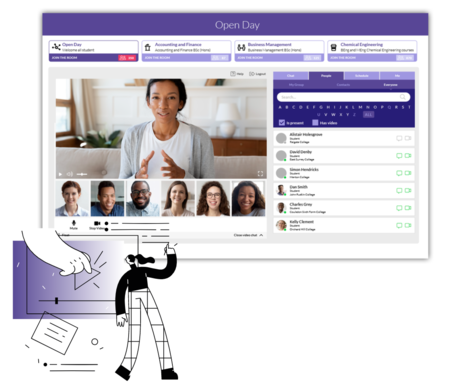
Why are universities going virtual for open days?
How colleges and universities are utilizing virtual events as a way to connect with prospective students.
Virtual tours and open days have added real value to higher education institutions in recruiting new students. As a result, universities are increasingly searching for solutions to accommodate the growing demand for prospective students wanting to view universities, courses, societies and amenities from the comfort of their homes. So why are colleges and universities now incorporating digital events into their long term strategy and why weren't they doing this before?
Sometimes you don't know what you need until it’s put in front of you. In 2020 due to Covid 19, the education sector like many was forced to go digital. Covid presented colleges and universities with an ultimatum; digital events and lessons or none at all. The education sector still had to recruit and promote their courses for the following years so all events were digitized. Out of what seemed like a negative situation brought great opportunities to colleges and universities, so much so that the majority are permanently incorporating digital tours and open days into their long term strategies.
What covid has brought to light is the need for more inclusive, cost-effective and sustainable solutions to promote courses and showcase universities. Through virtual open days, tours and recruitment fairs, universities discovered many benefits for both them and their students.
Greater recruitment opportunity
How many more students would you enroll if you gave them the option to attend open days virtually? You're not replacing the experience you're adding to it. Providing a virtual aspect can double, even triple your attendance. You are simply providing a more cost-effective and accessible option for prospective students to view your university. Students can now add more choices to their list and view universities they may not have been interested in viewing before. Where a prospective student may have been deterred from attending an open day a long distance away, they can now view all the benefits, engage with campus chats and discover more about university courses from the comfort of their own home. Providing a virtual option means you are removing the barriers of costs, long car, train or even plane journeys. Physical campus tours are a great experience for those who live close by and find it easy to get to. For those where it's logistically difficult to get to, it's off-putting. They could get irritated and find the day unenjoyable if traveling has been a problem, not a great first impression!
Providing virtual access also provides better opportunities for recruiting international students. Not only can universities and colleges save a significant amount of time and money, but going virtual also allows universities to host more events compared to in-person open days which means more recruitment opportunities.
Inclusivity
Prior to 2020, there was a slight resistance to the virtualisation of university events and open days because it could be argued it was not the best way to showcase the universities and provide a great visitor experience. Whilst you can not provide prospective students with the same experience in person, you can add to the experience with virtual and provide visitors with a choice of whether they wish to attend in person or virtually. Incorporating a digital solution allows a physical event to be more inclusive. Adding a digital choice to attend allows international students or those who live far away to attend virtually without having to go through unnecessary travel if they don't wish to. Digital options remove the fear of long journeys for those who find it emotionally or physically difficult.
A restriction to in-person open days is the travel cost and commitment for students and family members. Family members often want to and need to attend open days with students. It's difficult for guardians to take time off work to travel long distances and front the cost of the travel. As a result, the option to login and view universities is fast becoming the preferred option for guardians too.

Prospective students can attend more talks
Hosting open days in Evessio for Universities' virtual rooms allows the prospective student to be able to attend more talks and discussions on their chosen courses. You are eliminating the physical on-campus distractions. The student can move around virtual rooms and discussions in a few clicks rather than trying to get from one end of campus to the other.
It's more sustainable
Providing options to explore open days virtually encourages less travel and ultimately reduces carbon footprint. A long time before Covid, higher education, like so many other sectors, had come under pressure to look at sustainable alternatives to hosting events. Colleges and universities are now expected to deliver some of their event portfolios virtually or in hybrid forms. Having seen it done successfully as a result of Covid, it's now apparent this will be the way forward. A high proportion of an event’s carbon footprint comes from travel. Allowing prospective students to attend open days and university tours from home reduces the need to fly, travel by train or drive. Whilst you won’t necessarily reduce the number of attendees at your physical open day, it does attract those who live closely and encourages those who live far away to join virtually, therefore reducing travel. In a world where people are ever more concerned with their carbon footprint and environmental impacts, prospective students welcome sustainable options.

Insightful data
Evessio for Universities’ virtual rooms provide lead capture, data capture and analytics that you can't replicate at physical events. Lead capture can be difficult and chaotic at in-person events, universities have to run offers to incentivise students to hand over their data. By having an online event, data is automatically captured by students attending the event. Students are more likely to enter their details online at home rather than having to keep stopping to give their details at a physical event. Capturing data online is also more targeted and is higher quality. Students sign up to events, talks and courses that are actually relevant to them and that they're interested in, rather than handing over their details on the day for an aspect they're not interested in because they want a free slice of pizza!
Evessio for Universities provides powerful insights on student engagement at events. Understanding students' movement, behaviors, interactions and interests are extremely powerful and enable universities to better market to future prospective students. The platform allows you to see exactly how many people attended, what talks were attended, how many conversations were had and the length of conversations. The virtual rooms show you how many people signed up, attended and dropped out halfway through. This information and insights allow you to better market to students and continue to host successful events year on year. More meaningful data enables universities to provide relevant and interesting content by understanding what was popular and what wasn't.
Due to the success many universities experienced, virtual events are here to stay and more and more universities are seeking software to accommodate their virtual needs.
Ultimately virtual events are a cheaper, more convenient, more sustainable and are a much more accessible option for many.
Open your doors to a global audience with Evessio for Universities.

Claire Singleton
Marketing Manager
Claire is the Marketing Manager at Evessio, an industry-leading event management platform for awards, conferences and exhibitions. Claire has years of experience and specialises in marketing event software, marketing events and sponsorship. Claire has a proven track record of re-branding events and implementing strategies that doubled event participation. Claire made events that were breaking even or losing money highly profitable by increasing event participation and securing sponsorship from global brands.

